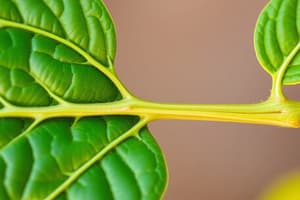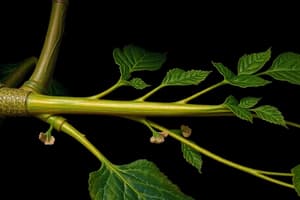Podcast
Questions and Answers
What is the primary function of xylem vessels in plants?
What is the primary function of xylem vessels in plants?
- Store carbohydrates for future use
- Carry water and minerals absorbed from the roots (correct)
- Transport food materials produced by the leaves
- Facilitate gas exchange during photosynthesis
Which of the following describes how plants transport substances against gravity?
Which of the following describes how plants transport substances against gravity?
- Active transport utilizing energy from ATP
- Combination of capillarity, root pressure, and transpiration pull (correct)
- Roots absorbing minerals through diffusion
- Movement facilitated by a central pump
What is the role of phloem in the plant transport system?
What is the role of phloem in the plant transport system?
- Transport water and nutrients
- Carry food produced by photosynthesis to different parts of the plant (correct)
- Facilitate mineral absorption in the roots
- Support the structure of the plant
Why do plants need a transport system?
Why do plants need a transport system?
What is one of the main problems plants face regarding transporting substances?
What is one of the main problems plants face regarding transporting substances?
What structure within the leaf allows water to exit into the atmosphere?
What structure within the leaf allows water to exit into the atmosphere?
Which factor does NOT contribute to the upward movement of water in the xylem?
Which factor does NOT contribute to the upward movement of water in the xylem?
How does root pressure contribute to water movement in plants?
How does root pressure contribute to water movement in plants?
What term describes the process of water evaporation from the surface of leaves?
What term describes the process of water evaporation from the surface of leaves?
What role does transpiration play in a plant’s ability to absorb water?
What role does transpiration play in a plant’s ability to absorb water?
Which statement about the relationship between transpiration rate and water uptake is accurate?
Which statement about the relationship between transpiration rate and water uptake is accurate?
What primary force assists in holding water molecules together, facilitating their movement in plants?
What primary force assists in holding water molecules together, facilitating their movement in plants?
Which of the following accurately describes a key factor in capillarity within the xylem?
Which of the following accurately describes a key factor in capillarity within the xylem?
What is the main role of xylem vessels in plants?
What is the main role of xylem vessels in plants?
Which component of the phloem is responsible for transporting organic substances?
Which component of the phloem is responsible for transporting organic substances?
What structural feature of xylem vessels allows for continuous water flow?
What structural feature of xylem vessels allows for continuous water flow?
Why do xylem vessels have thickened walls containing lignin?
Why do xylem vessels have thickened walls containing lignin?
What is one major difference between xylem and phloem in terms of cell type?
What is one major difference between xylem and phloem in terms of cell type?
Which of the following processes occurs last in the movement of water through a plant?
Which of the following processes occurs last in the movement of water through a plant?
What feature do companion cells in the phloem provide to sieve tubes?
What feature do companion cells in the phloem provide to sieve tubes?
What happens to water inside plant cells in relation to the surrounding air space?
What happens to water inside plant cells in relation to the surrounding air space?
Flashcards are hidden until you start studying
Study Notes
Plant Transport System
- Xylem carries water and minerals.
- Phloem carries food material which plants make.
- Vascular bundle is the combined name for xylem and phloem.
Reasons for Transport System
- Transport water and mineral salts from roots.
- Water acts as solvent for biochemical reactions and a reactant in photosynthesis.
- Mineral ions and salts synthesize chlorophyll and are vital for healthy growth.
- Transport carbohydrates produced by leaves to stem and roots for respiration, growth, and storage.
Transport System Limitations
- Plants lack a pumping system to circulate materials.
- Plants need to overcome gravity to move substances upward, which is challenging over vast distances.
Overcoming Transport Limitations
- Plants use a combination of capillarity, root pressure, and transpiration pull to transport water up the xylem.
Xylem Vessel Structure
- Xylem vessels are composed of four cell types:
- Xylem vessels
- Tracheids
- Parenchyma (food storage)
- Fibres (structural support)
- These cells are dead, lacking nuclei and cytoplasm.
- Xylem vessels and tracheids are responsible for water conduction.
- They are elongated cells arranged end-to-end.
- The end walls of xylem vessels are open to allow continuous upward water flow.
- Cell walls are thickened with lignin, providing strength to withstand tension during transpiration.
Phloem Vessel Structure
- Composed of four cell types:
- Sieve tubes: transport organic substances.
- Companion cells: support sieve tube function, containing a nucleus and abundant mitochondria.
- Parenchyma: provide storage.
- Fibres: provide structural support.
- Sieve tubes are cylindrical columns of long cells arranged end-to-end.
- They are living cells but lack a nucleus.
- Sieve plates at the ends of sieve tubes have pores that allow for substance transport.
Vascular Bundle Arrangement
- Roots: Xylem is in the center, surrounded by phloem.
- Stem: Phloem is on the outside, xylem is on the inside of the vascular bundle, arranged in a ring around the pith.
Water Movement Through Plants
- Absorption of water by root hair cells.
- Movement of water across the root cortex to the xylem.
- Movement of water up the xylem.
- Movement of water across leaf cells.
- Evaporation of water from the leaves.
Evaporation of Water (Transpiration)
- Water evaporates from leaf cells into the air spaces and diffuses out through the stomata down the concentration gradient.
Transpiration: Loss of Water from Leaves
- Transpiration is the evaporation of water from the surface of leaves.
Significance of Transpiration
- Pulls water up to the leaves for photosynthesis.
- Transports dissolved mineral salts to the leaves.
- Cools the plant.
Transpiration Rate
- The rate of water uptake by a plant depends on the transpiration rate.
- Higher transpiration rate leads to faster water uptake.
Factors Affecting Transpiration Rate
- Factors that influence the transpiration rate include:
- Light Intensity: Higher light intensity increases transpiration.
- Temperature: Warmer temperatures increase transpiration.
- Humidity: Lower humidity increases transpiration.
- Wind: Increased wind speeds increase transpiration.
Movement of water within the leaf
- Water evaporates from cells near the air spaces, lowering concentration in those cells (A).
- The concentration in adjacent cells (B) is higher than in cells (A), causing water to move from cells (B) to (A) by osmosis.
Movement of Water Up the Xylem
- Three factors contribute to water movement up the xylem:
- Capillarity:
- Adhesion: attraction between water molecules and xylem vessel walls.
- Cohesion: water molecules sticking together.
- Root pressure:
- Water constantly moves into root cells due to a lower water concentration than the soil.
- This creates pressure in the root xylem, which is higher than in the leaf xylem, resulting in water movement from roots to leaves.
- Transpiration pull:
- The cohesive forces between water molecules and the loss of water by evaporation create tension that pulls water upwards.
- Capillarity:
Absorption of Water by Root Hair Cells
- Root hair cells are specialized to increase surface area, facilitating water absorption through osmosis.
Movement of Water Across the Root Cortex
- Water passes through the root cortex layers via osmosis and cell-to-cell movement.
- It eventually reaches the xylem vessels.
Studying That Suits You
Use AI to generate personalized quizzes and flashcards to suit your learning preferences.




